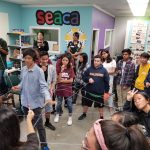SEACA was originally founded 18 years ago to train low-income southeast Asian youth to become leaders and organizers for racial and economic justice and over the years we’ve grown and shifted to include policy advocacy and coalition building work on issues of affordable housing and environmental justice.
March 16, 2020 marked the biggest shift in our organization’s history to that of a pandemic relief organization when our board unanimously voted to set aside $10,000 to establish an emergency fund. The funds and any additional that we raise in the coming weeks through individual donations will be used to buy food, supplies, and provide financial support for at-risk community members.
This shift is a huge risk and one that we do not make lightly. We’re a small organization with less than $5000 in reserves and no experience providing aid or direct services. But we decided that providing immediate emergency assistance was more important than hoarding what little we had. We began shifting funding from existing grants and then asked for permission from our foundation partners later. As scary as it was, it was an easy decision for our board to make because they knew that our communities would be hit the hardest and would likely receive the least amount of aid, if any at all.
While the Coronavirus has upended all of our lives, those of us in Chinatown and other low-income Asian American communities face unique challenges that are largely being ignored by both the government and philanthropic sectors. We were hit with the economic impacts of the Coronavirus back in January due racist assumptions that Asian communities were more likely to carry the virus. Our restaurants and small businesses started experiencing a 60% drop in business, leading to many of our parents getting laid off from their restaurant jobs in February.
Given that many of the public assistance and private aid programs ask in their applications, “how has Coronavirus impacted you?” I’ve had to repeatedly ask, “Does Coronavirus-related racism count?”
Though I am grateful for all the relief programs that are being established, especially the programs targeting our most vulnerable residents, but I also can’t help but question what it says about our society when elected officials offer to cover all our Coronavirus related medical costs but not if you have cancer or if I become a victim of a Coronavirus-related hate crime.
Meanwhile our communities continue to struggle, just as they did before the Coronavirus. Our residents are still getting harassed by their landlords who are demanding rent increases of as much as 300%. A number of our community serving small businesses just this month got eviction notices so that the developer can replace them with gentrifying businesses that will be unaffordable and inaccessible to our residents.
Unfortunately the eviction moratoriums and rent relief programs being debated at the state and local levels are mainly limited to those that can prove Coronavirus related hardship. If your problem is that your landlord is a greedy asshole, you’re out of luck, even if your eviction means homelessness, which is a very likely outcome for the majority of folks in Chinatown.
I truly hope that this shift for SEACA is temporary and that the public aid programs that are being established better meet the needs of low-income Asian American communities. In the meanwhile we will continue to work with our residents to provide care packages and food assistance.
To quote my friend Rudy Espinoza, whose organization is setting an emergency relief fund for street vendors, “We may end up shutting down, but we’re not going down without a fight.”
To support SEACA’s work, Pandemic or otherwise, please go to www.seaca-la.org/donate


